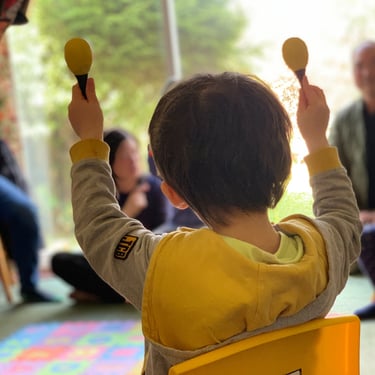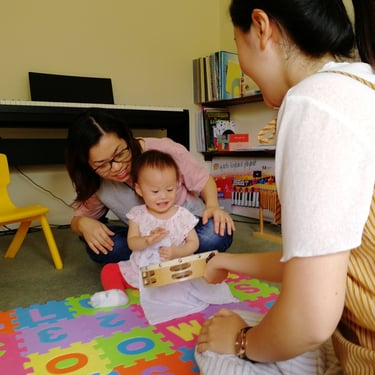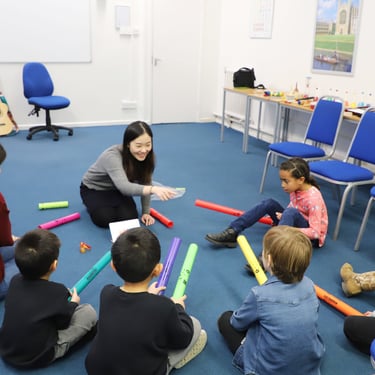Finding Calm and Confidence Through Music Therapy Classes
Find calm through music therapy classes - a creative and relaxing way to improve wellbeing, boost self-expression, and support emotional balance.
MUSIC THERAPY CLASSES
10/29/20254 min read


It’s amazing what music can do. You can be having a long, difficult day, then a song plays, and everything softens. You breathe differently. Your mind slows down a little. That’s where the idea of music therapy classes comes from. We see every week how sound and rhythm help people find peace, confidence, and connection again.
What Music Therapy Really Means?
When people first hear therapy, they often imagine talking on a sofa. But music therapy classes are quite different. You don't have to talk much at all, and you don’t need to be musical either. The focus is on what the sound does for you, how it helps you relax, communicate, or release emotion that’s been sitting quietly for too long. In a session, you might play a drum, hum a tune, or simply listen. There’s no pressure to get it right. The therapist gently guides you, adapting the pace to your mood and comfort level. Some days are energetic; others are slow and reflective. That’s what makes music therapy classes feel so personal; they change with you.
The Real Benefits
It is different for everyone. Some will say that the sessions help them feel uplifted, others notice they think with greater intensity, and others notice a decrease in anxious thoughts. For children, the classes can help with learning and speech. For older adults, music can help with memory and connection to others in the social context. We have witnessed very quiet children engage, and adults return to joy after stress or loss. The magic is not in the instruments; it is in the connection that happens between the music and the person hearing it. This gentle interaction is really what builds confidence and a state of calm in a way that is often not easily available via words.
Why Does Music Work So Deeply?
Music affects both sides of the brain, the logical and the emotional. It can change heart rate, improve coordination, and lift mood almost instantly. That’s why our music therapy classes are useful for people dealing with anxiety, autism, trauma, or communication challenges. It’s incredible to see how a simple rhythm can help someone breathe more easily or smile again after weeks of worry. It’s real, visible progress, not forced, just naturally unfolding through sound.
Who Comes to These Classes?
You would find it jaw-dropping how many diverse types of people come to music therapy classes- Parents bring children with difficulty expressing emotions. Adults come in for stress management or self-care. Sometimes older clients come in to just have company as much as therapy, and still, they share their old tunes they remember from back in their day. These sessions are completely flexible and customizable. You could show up alone for some quiet time, or you may enter with a group and share an experience. Each individual who comes through the door has their own reason. But they will all walk out feeling lighter.
What a Typical Session Looks Like?
There is no strict formula, and that is part of the point. You arrive, settle in, and the therapist will guide the group through sound-based activities. You may play instruments, move rhythmically, or just listen and reflect. Each class is gentle and respectful to us. In some classes, we'll have soft background music, and in others we'll have more hands-on experiences. It honestly depends on what your body needs from you that day. Sometimes people cry, sometimes people laugh, and sometimes people simply breathe easier; the important thing is that it is all healing through music!
A Safe, Creative Space
One thing we hear often is, I don't have a musical bone in my body. And that’s fine. You don't need one. Our music therapy classes are not about performing; they're about feeling. You can make noise, sit quietly, or do a mix of both. The room is calm, with soft light and instruments within reach. There’s no judgment, no competition, just time for you to connect with yourself. People tell us it feels like stepping into a different world for a little while, one that helps everything slow down.
Why Choose Chorus Music Therapy and Education?
There are good reasons people trust us for music therapy classes. Our therapists are both musicians and trained professionals who understand how music interacts with emotion, memory, and health. They know when to step in and when to let silence do the work. We offer both one-to-one and group options, and we tailor every session to suit your pace. Our approach combines warmth, professionalism, and creativity, the kind of mix that really helps people grow in confidence and calmness over time.
How to Start Your Journey?
If you’ve been considering music therapy, there couldn’t be a better time to connect with Chorus Music Therapy and Education. The booking process for music therapy classes through our website is easy; we just need to talk about your hopes for music therapy, and we can talk through some of the options for activities available for you or your loved one. Some people join Chorus Music Therapy and Education for a course; others stay longer because they appreciate the calmness and the process. No matter how long you join for, we want to make sure you will feel supported from your very first session.
Life can be loud, right? Work, worries, constant screens, it’s so easy to lose track of, and connections to what grounds us. Music therapy classes provide a place for you to breathe again and listen, feel, and let go. At Chorus Music Therapy & Education, we have seen music reconnect families, build confidence in children, and create moments of calm for people who thought calm was impossible, and we do what we do because of this. If you needed a reason to give it a try, do come and find out for yourself. Let music do the healing. As someone once said to me, sometimes the right note, in the right place, can change everything.




